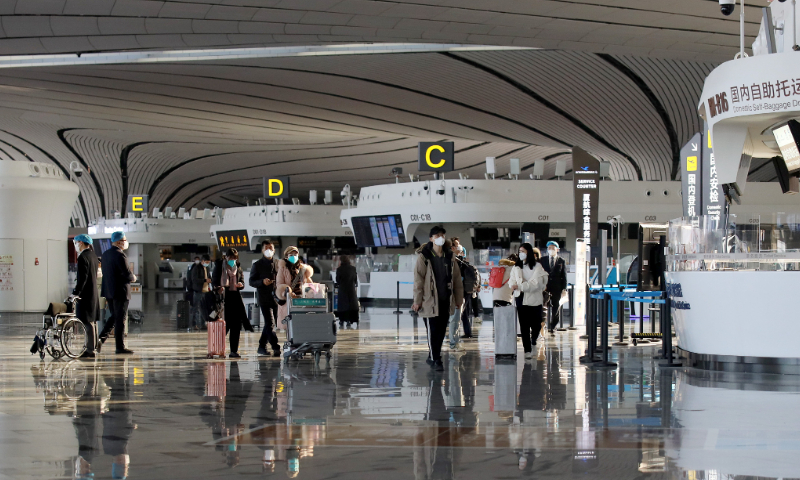
The photo taken on December 8, 2022 shows passengers at Beijing Daxing International Airport. Photo: VCG
China will cancel inbound quarantine for international arrivals, and vows to orderly resume Chinese citizens' outbound travel as part of an overall plan to downgrade the country's COVID-19 management from January 8 of 2023.
The rules which were released on Monday night, said travelers to China are required to take a nucleic acid test 48 hours before departure and those with negative results can enter the country without having to apply for a green health code from Chinese embassies and consulates abroad. They need to fill in the results in the customs health declaration forms. If they test positive, traveling to China will be allowed after the results turn negative.
Furthermore, COVID-19 testing and centralized isolation for all overseas travelers entering China will be canceled, and those with a normal health declaration and no abnormality in routine quarantines at the customs port can be green-lighted to social mobility, according to the plan.
Additionally, the plan eyes a continued improvement in arrangements for foreign nationals traveling to China for work and production resumption, business, study, family visits and reunions. Visa applications under these scenarios will be facilitated, according to the plan, and passenger entry and exit at sea and land ports will be gradually resumed.
Outbound travel of Chinese citizens will also be resumed in an orderly manner, in accordance with the global epidemic situation and varied service guarantee capabilities.
All airlines should continue to do a good job in on-board epidemic prevention, and passengers must wear masks when boarding, the rules said.
Data from travel platform qunar.com showed that search volume for international air tickets increased by 7 times within 15 minutes after China announced to scrap COVID-19 flight ban and load factor for inbound passenger flights and vowed to orderly resume citizens' outbound travel. The popular destinations are Thailand, Japan and South Korea.
The booking volume of international hotels has gradually increased since December. Among them, Macao, Hong Kong, and overseas countries with visa-free policies are the first choice for domestic tourists, according to data from qunar.com.
The number of Macao hotel reservations on the Qunar platform has doubled from the beginning of December. Overseas regions, such as the Philippines, France, and Thailand have higher hotel reservations. The booking for Philippines hotels has more than doubled.
More overseas carriers are mapping more inbound routes back to the Chinese mainland.
Asiana Airlines will have 10 round-trips of direct flights between China and South Korea in January, including nine cities including Tianjin and Chengdu.
On December 21, Air France announced that the Shanghai-Paris route will increase to three flights a week starting from February 4, 2023. The newly added third flight will be operated by Boeing 777-300ER, which can carry up to 381 passengers. Air France will gradually increase passenger capacity to meet the growing demand in the Chinese market.
KLM Royal Dutch Airlines announced on December 19 that it will add three flights per week on the route between the Netherlands and China, including two flights between Amsterdam and Shanghai every week and one flight between Amsterdam and Hangzhou. The above flights will start operating from January 30, 2023.
From December 20, Qatar Airways increased the frequencies from Hangzhou to Doha and resumed the route from Shanghai to Doha.
Global Times




